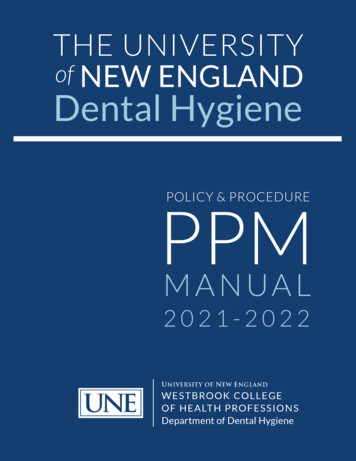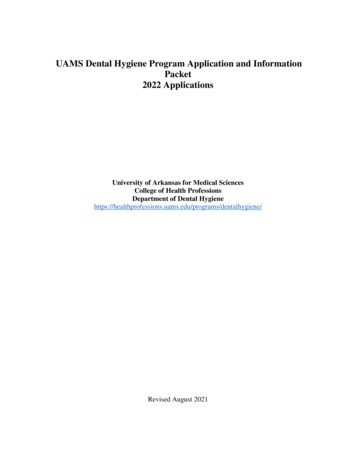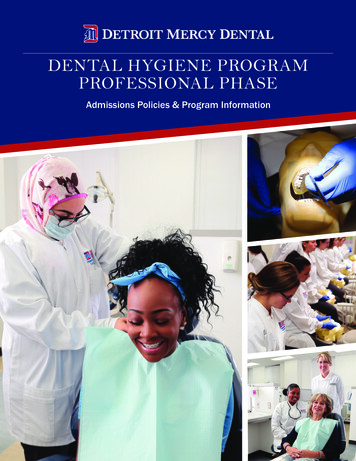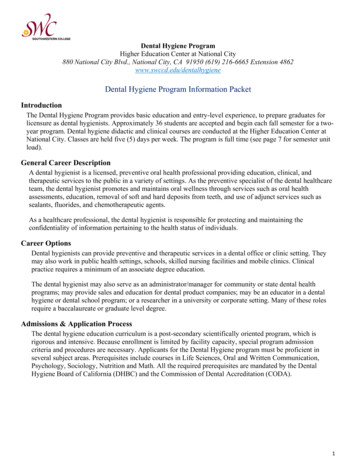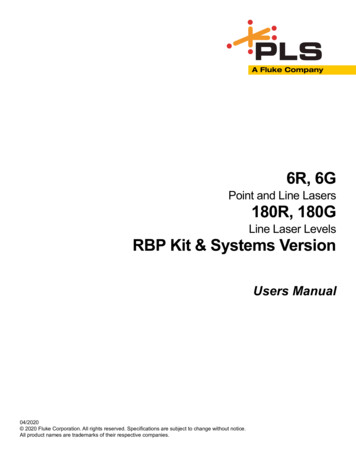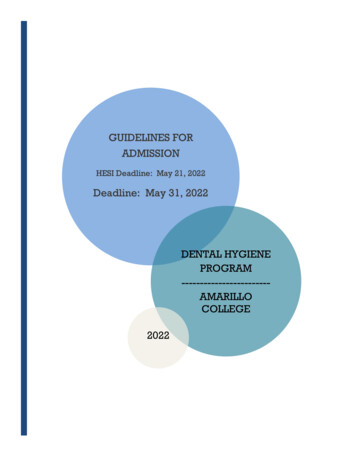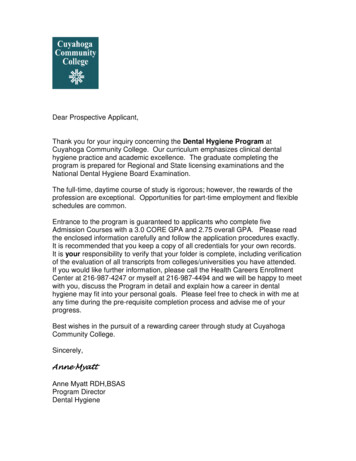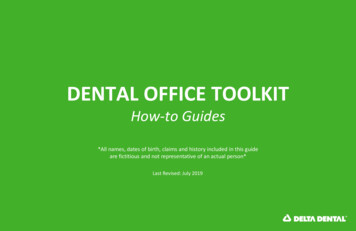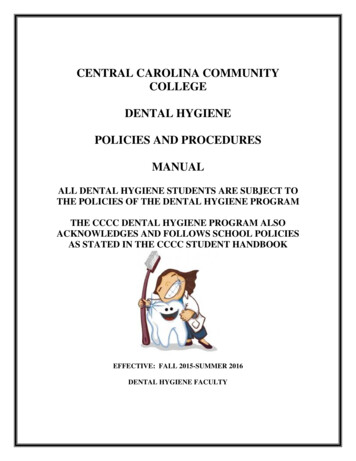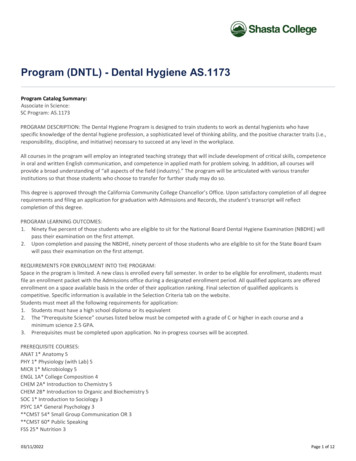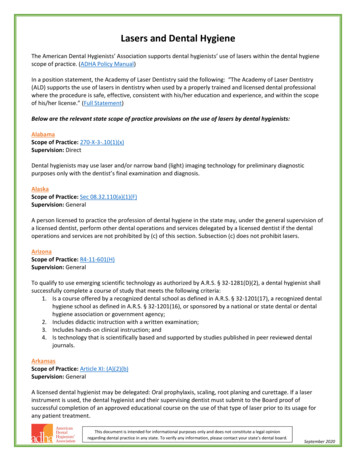
Transcription
Lasers and Dental HygieneThe American Dental Hygienists’ Association supports dental hygienists’ use of lasers within the dental hygienescope of practice. (ADHA Policy Manual)In a position statement, the Academy of Laser Dentistry said the following: “The Academy of Laser Dentistry(ALD) supports the use of lasers in dentistry when used by a properly trained and licensed dental professionalwhere the procedure is safe, effective, consistent with his/her education and experience, and within the scopeof his/her license.” (Full Statement)Below are the relevant state scope of practice provisions on the use of lasers by dental hygienists:AlabamaScope of Practice: 270-X-3-.10(1)(x)Supervision: DirectDental hygienists may use laser and/or narrow band (light) imaging technology for preliminary diagnosticpurposes only with the dentist’s final examination and diagnosis.AlaskaScope of Practice: Sec 08.32.110(a)(1)(F)Supervision: GeneralA person licensed to practice the profession of dental hygiene in the state may, under the general supervision ofa licensed dentist, perform other dental operations and services delegated by a licensed dentist if the dentaloperations and services are not prohibited by (c) of this section. Subsection (c) does not prohibit lasers.ArizonaScope of Practice: R4-11-601(H)Supervision: GeneralTo qualify to use emerging scientific technology as authorized by A.R.S. § 32-1281(D)(2), a dental hygienist shallsuccessfully complete a course of study that meets the following criteria:1. Is a course offered by a recognized dental school as defined in A.R.S. § 32-1201(17), a recognized dentalhygiene school as defined in A.R.S. § 32-1201(16), or sponsored by a national or state dental or dentalhygiene association or government agency;2. Includes didactic instruction with a written examination;3. Includes hands-on clinical instruction; and4. Is technology that is scientifically based and supported by studies published in peer reviewed dentaljournals.ArkansasScope of Practice: Article XI: (A)(2)(b)Supervision: GeneralA licensed dental hygienist may be delegated: Oral prophylaxis, scaling, root planing and curettage. If a laserinstrument is used, the dental hygienist and their supervising dentist must submit to the Board proof ofsuccessful completion of an approved educational course on the use of that type of laser prior to its usage forany patient treatment.This document is intended for informational purposes only and does not constitute a legal opinionregarding dental practice in any state. To verify any information, please contact your state’s dental board.September 2020
CaliforniaScope of Practice: §1914Supervision: General or direct depending on service or procedureA registered dental hygienist may use any material or device approved for use in the performance of a service orprocedure within his or her scope of practice under the appropriate level of supervision, if he or she has theappropriate education and training required to use the material or device.ColoradoScope of Practice: Rule 1.24Supervision: Indirect or DirectLaser use by a dental hygienist can only be performed under the indirect or direct supervision of a dentist andmust be within the dental hygiene scope of practice. A licensee who is a laser user must first successfullycomplete training that covers a minimum of eight hours of laser physics, safety, and appropriate use, to includea hands on component, prior to utilizing the laser.ConnecticutScope of Practice: SilentSupervision: SilentThe practice act and regulations do not mention use of lasers. Section 20-126l(e) does prohibit dental hygienistfrom cutting or removing any hard or soft tissue.DelawareScope of Practice: SilentSupervision: GeneralThe practice act and regulations do not mention use of lasers. Rule 2.5 places the full responsibility for the workdone by dental hygienists directly upon the dentist.FloridaScope of Practice: 64B5-16.001Supervision: Direct, indirect, or generalDental hygienists may use lasers as an assessment device. Lasers are otherwise not permitted for remediabletasks.GeorgiaScope of Practice: Rule 150-5-.03Nothing in these rules shall be construed as authorizing dental hygienists to utilize other techniques in thecourse of the performance of their duties, otherwise authorized by these rules. Only dentists licensed by theGeorgia Board of Dentistry shall be authorized to perform procedures involving laser technology which alterstissue, creates thermal effect, or is intended to cut, coagulate, photocoagulate, vaporize, or ablate essentiallyany soft or hard tissues of the body.This document is intended for informational purposes only and does not constitute a legal opinionregarding dental practice in any state. To verify any information, please contact your state’s dental board.September 2020
HawaiiScope of Practice: SilentSupervision: Direct or generalThe practice act and regulations do not mention use of lasers. §447-3 states a dental hygienist may provide anyother procedures delegated by a dentist in accordance with the rules of the board of dentistry.IdahoScope of Practice: 19.01.01 – 033.03Supervision: DirectA dental hygienist may use lasers restricted to gingival curettage and bleaching.IllinoisScope of Practice: §1220.240Supervision: GeneralDental hygienists are prohibited from using lasers to remove tissue.IndianaScope of Practice: §25-13-1-10Supervision: Direct or prescriptive supervisionA dental hygienist may not use a laser to cut, ablate, or cauterize hard or soft tissue to provide treatment to apatient.IowaScope of Practice: Board of Dental Examiners’ Position Statement – April 17, 2003Supervision: General, direct, or public health supervisionThe board recommends that all licensees need to be fully instructed in a recognized course prior to utilizing alaser. In addition, any services provided by a licensee, regardless of the device used, must be within the scope ofpractice for each licensee. Dental hygienists, for example, cannot utilize a laser or other device to cut tissue.KansasScope of Practice: SilentSupervision: Direct or generalThe practice act and regulations do not mention use of lasers. §65-1456 includes preventive and therapeuticprocedures within the dental hygiene scope of practice.KentuckyScope of Practice: KAR 8:562 Section 14Supervision: DirectA dental hygienist may perform laser debridement after submitting an application and fee and completingboard-approved training.This document is intended for informational purposes only and does not constitute a legal opinionregarding dental practice in any state. To verify any information, please contact your state’s dental board.September 2020
LouisianaScope of Practice: §701(B)(2) & §1301A dentist may not delegate to a dental hygienist: a surgical or cutting procedure on hard or soft tissue includingwith a laser. A laser capable of the removal of hard or soft tissue may be employed in the treatment of a dentalpatient only by a licensed dentist.MaineScope of Practice: SilentSupervision: GeneralThe practice act and regulations are silent on the use of lasers. §18374 allows dental hygienists to perform allprocedures necessary for complete prophylaxis, including root planing.MarylandScope of Practice: SilentThe practice act and regulations are silent on the use of lasers. The Board of Dental Examiner’s PermissibleProcedures Chart does not include laser bleaching within the scope of dental hygiene.MassachusettsScope of Practice: 234 CMR 5.11Supervision: DirectDental hygienists may use diagnostic and periodontic non-cutting lasers.MichiganScope of Practice: Position Statement of the Michigan Department of Licensing and Regulatory AffairsSupervision: Subject to position statement and procedure.A physician/dentist may delegate the use of laser equipment to a licensed or unlicensed individual if thedelegated individual works under the physician/dentist’s supervision. The position statement includes minimumrequirements for supervision.MinnesotaScope of Practice: SilentThe practice act and regulations are silent on lasers.MississippiScope of Practice: Rule 13The Board of Dental Examiners has determined that dental hygienists are not permitted to perform sulculardebridement of periodontal pockets using a diode dental laser. Additionally, the board determined dentalhygienists may not use lasers for bacteria reduction and reduction of pocket depths. The board also determineddental hygienists may not use soft tissue lasers to assist in the treatment of periodontal diseases and other softtissue disorders.This document is intended for informational purposes only and does not constitute a legal opinionregarding dental practice in any state. To verify any information, please contact your state’s dental board.September 2020
MissouriScope of Practice: SilentThe practice act and regulations are silent on the use of lasers.MontanaScope of Practice: SilentThe practice act and regulations are silent on the use of lasers.NebraskaScope of Practice: SilentThe practice act and regulations are silent on the use of lasers.NevadaScope of Practice: NAC 631.033 & 631.210Supervision: Supervision by a dentistIn order to use lasers intrasulcular periodontal procedures or tooth whitening procedures, a licensee mustinclude with the application for renewal:1. A statement certifying that each laser used by the licensee in his or her practice of dentistry ordental hygiene has been cleared by the Food and Drug Administration for use in dentistry; and2. Proof that he or she has successfully completed a course in laser proficiency that:(a) Is at least 6 hours in length; and(b) Is based on the Curriculum Guidelines and Standards for Dental Laser Education, adopted byreference pursuant to NAC 631.035.Through Advisory Opinion 15-0619, the Board found that lasers used for diagnostic purposes are exempt fromthe regulation above.New HampshireScope of Practice: SilentThe practice act and regulations are silent on the use of lasers.New JerseyScope of Practice: Prohibitive language §13:30-1A.3 & 13:30-1A.4The administrative code includes several prohibitive clauses like: “Such instruments shall not include lasers thatare capable of altering, cutting, burning, or damaging hard or soft tissue”New MexicoScope of Practice: §16.5.29.12Supervision: IndirectDental hygienists may use lasers for therapeutic use including soft tissue curettage, sulcular debridement, andtissue disinfection in periodontal therapy. Requirements include using lasers approved by the FDA, complete aneducational program that is a minimum of 6 hours with hands-on clinical simulation training, and post certificatein dental facility.This document is intended for informational purposes only and does not constitute a legal opinionregarding dental practice in any state. To verify any information, please contact your state’s dental board.September 2020
New YorkScope of Practice: SilentThe practice act and regulations are silent on the use of lasers.North CarolinaScope of Practice: 21 NCAC 16G .0101Supervision: DirectDental hygienists may use laser fluorescence detectors in preparation for the dentist's examination anddiagnosis of cavitiesNorth DakotaScope of Practice: Board PositionSupervision: GeneralIt is the position of the Board that any services provided by a licensee, regardless of the device used, must bewithin the scope of practice for each licensee. Whenever a new treatment modality is brought forward, it is theBoard’s policy that the dentist must have equal or greater proficiency and training in the technology. Neither theparticular technology utilized nor amendments to scope of practice alter the fact that all licensees areresponsible for their individual actions with the dentist ultimately responsible for all care provided in eachdental office.OhioScope of Practice: 4715-11-06Dental hygienists are not allowed to use lasers except for caries susceptibility testing devices.OklahomaScope of Practice: SilentThe practice act and regulations are silent on the use of lasers. Regulation §195:15-5 prohibits dental assistantsfrom utilizing lasers.OregonScope of Practice: SilentThe practice act and regulations are silent on the use of lasers. Regulation §818-042-0040 prohibits dentalassistants from utilizing lasers, except laser-curing lights.PennsylvaniaScope of Practice: Practice Act and Regulation §33.215Practice Act: Licensed dentists may assign to dental hygienists intra-oral procedures which the hygienists havebeen educated to perform and which require their professional competence and skill but which do not requirethe professional competence and skill of the dentist. Such assignments shall be under the supervision of alicensed dentist.This document is intended for informational purposes only and does not constitute a legal opinionregarding dental practice in any state. To verify any information, please contact your state’s dental board.September 2020
Regulation:(a) Background and purpose. The use of lasers in experimental and institutional settings has raised questionswith regard to using this technology in the dental office. In addressing this issue, the Board has been mindful ofits principal mandate: protection of the public. Section 4.1(a)(8) and (9) of the act (63 P. S. § 123.1(a)(8) and (9))authorizes the Board to take disciplinary action against licensees who engage in unprofessional conduct or whocommit acts of negligence, incompetence or malpractice. The use of lasers may implicate both provisions by, forexample, generating complaints of incompetent treatment or treatment that fails to conform to acceptablestandards of practice. The Board offers the following guidelines to assist its licensees in conforming theirbehavior to the act. In a disciplinary action brought against a dentist for treatment involving a laser, the Boardwill consider whether these guidelines were followed.(b) Guidelines. A dentist who uses a laser in private practice shall:(1) Be familiar with and conform to regulations on lasers promulgated by the Food and DrugAdministration.(2) Possess clinical competency in the use of lasers. The Board recommends a minimum of 6 hours ofinstruction given by an accredited institution or by a manufacturer of lasers sponsored by such aninstitution. The instruction should include hands-on training and should cover all known risks topatients, staff and the practitioner.Rhode IslandScope of Practice: SilentThe practice act and regulations are silent on the use of lasers.South CarolinaScope of Practice: Board PolicyDental hygienists are not authorized to use lasers in performing bleaching of teeth procedures; they may,however, perform the isolation and clean-up proceduresSouth DakotaScope of Practice: SilentThe practice act and regulations are silent on the use of lasers. Regulation §20:43:08:10 prohibits dentalassistants from utilizing lasers.TennesseeScope of Practice: Board Policy & §0460-03-.09Supervision: Under supervision of a dentistDental hygienists may use lasers for examination and periodontal treatment. Additionally, a dental hygienistmay use lasers for debridement and bacterial reduction following completion of a didactic and hands-on trainingcourse.TexasScope of Practice: §115.2Supervision: DirectDental hygienists may use lasers as long as the procedure is not irreversible or involves intentional cutting. Priorto using lasers, dental hygienist must complete at least 12 hours of continuing education related to laser use.This document is intended for informational purposes only and does not constitute a legal opinionregarding dental practice in any state. To verify any information, please contact your state’s dental board.September 2020
UtahScope of Practice: R156-69-602Supervision: GeneralDental hygienists may perform laser bleaching and laser periodontal debridement.VermontScope of Practice: Silent; Rules pendingSupervision: Determined by practice agreementThe practice act and regulations are silent on the use of lasers. Rules are pending that specifically mention use ofperiodontal lasers within the dental hygiene scope of practice.VirginiaScope of Practice: 18VAC60-25-40Supervision: Indirect or GeneralDental hygienists my use non-surgical lasers for scaling, root planning, or gingival curettage of natural andrestored teeth.WashingtonScope of Practice: SilentThe practice act and regulations are silent on the use of lasersWest VirginiaScope of Practice: Position StatementThe Board regards the use of any laser which can cut tissue to be practicing dentistry, and therefore limits its useto dentists. This includes the so-called “low power” lasers used for periodontal treatments, such as pocketdebridement, scaling, polishing, planing, and the removal of calculus deposits. The Board will allow the use oflasers that are used as an alternative to a traditional curing light to be used by a dental hygienist or dentalassistant for the sole purpose of curing resin restorations. In addition, the Board will also allow the use of thelaser as a diagnostic aid by a dental hygienist or dental assistant for interpretation by the dentist.WisconsinScope of Practice: Position StatementIt is the position of the Wisconsin Dental Examining Board that utilization of a laser device by a hygienist, isallowed when used within the scope of practice of dental hygiene and in adherence to Wis. Stat. § 447.06(2)(b),§ 447.06(2)(c), § 447.06(2)(d), and § 447.06(2)(e). At this time, laser use within the scope of dental hygiene practice is as an adjunct device to scaling androot planning.Training is necessary and should include a hands-on proficiency course provided by a recognized sponsorof continuing education, in accordance with the current rules for continuing education.Licensees utilizing laser technology should maintain documentation of the satisfactory completion of theformal continuing education or training.This document is intended for informational purposes only and does not constitute a legal opinionregarding dental practice in any state. To verify any information, please contact your state’s dental board.September 2020
WyomingScope of Practice: Chapter 7, Section 5Dental hygienists with an expanded functions permit, may use lasers to provide soft tissue therapy within thedental hygienists scope of practice. Dental hygienists shall NOT use lasers at settings intended to cut/removehard tissue or tooth structureThis document is intended for informational purposes only and does not constitute a legal opinionregarding dental practice in any state. To verify any information, please contact your state’s dental board.September 2020
The practice act and regulations do not mention use of lasers. Section 20 -126l(e) does prohibit dental hygienist from cutting or removing any hard or soft tissue. Delaware Scope of Practice: Silent . Supervision: General . The practice act and regulations do not mention use of lasers. Rule 2.5. places the full responsibility for the work
